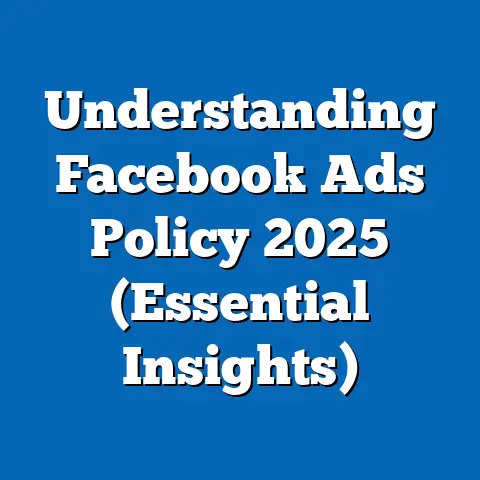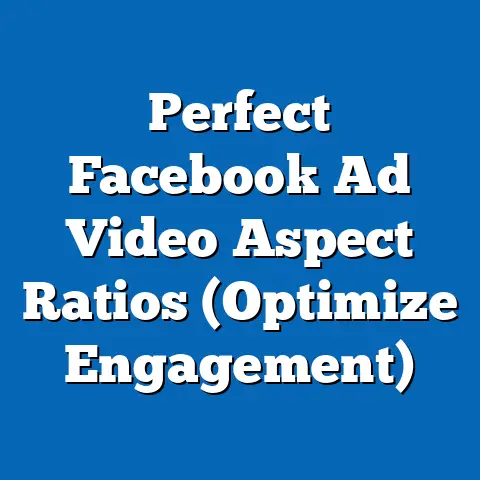Reactivating Facebook Ad Account: Expert Solutions (Critical Insights)
So, let’s get into it, shall we?
Understanding the Facebook Ad Ecosystem
Facebook ads are more than just pretty pictures and catchy slogans; they’re the lifeblood of many businesses in today’s digital age. As someone who’s seen firsthand the transformative power of a well-executed Facebook ad campaign, I can attest to their importance. But before we get into the nitty-gritty of reactivating accounts, let’s lay the groundwork by understanding the ecosystem we’re operating in.
The Role of Facebook Ads in Digital Marketing
In the vast and ever-evolving world of digital marketing, Facebook ads stand out as a powerful tool for reaching a massive audience with laser-like precision. I mean, think about it: Facebook boasts billions of active users, each with their own unique interests, demographics, and behaviors. That’s a goldmine of potential customers just waiting to be tapped into.
- Broad Reach: Facebook’s sheer size allows advertisers to reach a global audience, making it an ideal platform for businesses looking to expand their reach beyond local markets.
- Precise Targeting: This is where Facebook ads truly shine. With its sophisticated targeting options, advertisers can pinpoint their ideal customers based on demographics, interests, behaviors, and even custom audiences created from their own customer data.
- Diverse Ad Formats: From eye-catching image ads to engaging video ads and immersive carousel ads, Facebook offers a variety of ad formats to suit different marketing objectives and creative visions.
- Measurable Results: Unlike traditional advertising methods, Facebook ads provide detailed analytics and reporting, allowing advertisers to track their campaign performance and make data-driven optimizations.
Types of Facebook Ad Accounts and Their Purposes
Now, let’s talk about the different types of Facebook ad accounts you might encounter. It’s not just a one-size-fits-all situation here.
- Personal Ad Account: This is the most basic type of ad account, typically linked to an individual’s personal Facebook profile. It’s suitable for small businesses or individuals who are just starting out with Facebook advertising.
- Business Manager Account: For larger businesses or agencies managing multiple ad accounts, the Business Manager account is the way to go. It provides a centralized platform for managing ad accounts, pages, and users, making it easier to collaborate and control access.
- Agency Ad Account: Agencies often have dedicated ad accounts that allow them to manage campaigns on behalf of their clients. These accounts come with additional features and support to streamline agency operations.
The Importance of Compliance with Facebook’s Advertising Policies
Here’s where things get serious. Facebook’s advertising policies are the rules of the game, and if you want to play, you need to abide by them. These policies are in place to protect users from misleading, offensive, or harmful content, and Facebook takes them very seriously. I cannot stress this enough: Ignoring these policies is a surefire way to get your ad account deactivated.
- Prohibited Content: This includes things like hate speech, discrimination, violence, and illegal activities. Obviously, you want to steer clear of anything that falls into these categories.
- Misleading Information: Don’t make false claims or exaggerate the benefits of your products or services. Be honest and transparent in your advertising.
- Personal Attributes: Avoid targeting users based on sensitive personal attributes like race, ethnicity, religion, or sexual orientation.
- Health and Medical Content: Be cautious when advertising health-related products or services. Facebook has strict guidelines around what you can and cannot say in this area.
Statistics on Ad Account Deactivations
According to recent studies, a significant percentage of Facebook ad accounts face deactivation at some point. While the exact numbers vary, it’s safe to say that it’s a common occurrence, especially for new advertisers who may not be fully aware of the platform’s policies. I’ve seen estimates ranging from 5% to 15% of accounts experiencing some form of restriction or deactivation.
One of the primary reasons behind this is the automated nature of Facebook’s ad review system. Algorithms are constantly scanning ads for potential violations, and sometimes, they flag accounts incorrectly. This can be frustrating, but it’s important to remember that it’s part of the process.
Key Takeaway: Understanding the Facebook ad ecosystem, including its reach, targeting capabilities, ad formats, and policies, is essential for successful advertising and avoiding account deactivation.
Common Reasons for Ad Account Deactivation
Okay, let’s get down to the nitty-gritty. Why do Facebook ad accounts get deactivated in the first place? Well, there are several reasons, and I’ve seen them all firsthand. It’s like being a digital marketing detective, trying to piece together the clues and figure out what went wrong.
Policy Violations
This is the most common reason for ad account deactivation, and it’s something you need to take very seriously. Facebook’s advertising policies are extensive and cover a wide range of topics, from prohibited content to misleading information.
- Prohibited Content: As I mentioned earlier, this includes things like hate speech, discrimination, violence, and illegal activities. But it also extends to more nuanced areas like promoting counterfeit products or engaging in deceptive practices.
- Misleading Information: Don’t make false claims or exaggerate the benefits of your products or services. Be transparent and honest in your advertising.
- Personal Attributes: Avoid targeting users based on sensitive personal attributes like race, ethnicity, religion, or sexual orientation.
- Health and Medical Content: Be cautious when advertising health-related products or services. Facebook has strict guidelines around what you can and cannot say in this area.
Unusual Activity Flags
Facebook’s algorithms are constantly monitoring ad accounts for suspicious activity. If they detect something out of the ordinary, they may flag your account for review, which can lead to deactivation.
- Sudden Spikes in Spending: If you suddenly increase your ad spend significantly, Facebook may see it as a sign of fraudulent activity and flag your account.
- Unusual Ad Content: If you start running ads that are drastically different from your previous campaigns, Facebook may flag your account for review.
- Suspicious Login Attempts: If Facebook detects login attempts from unusual locations or devices, they may flag your account as a security risk.
Payment Issues
Payment issues are another common cause of ad account deactivation. If your payment method is invalid, expired, or if you have an outstanding balance, Facebook may suspend your account until the issue is resolved.
- Expired Credit Cards: Make sure your credit card information is up-to-date and that your card hasn’t expired.
- Unpaid Balances: Pay your advertising bills on time to avoid account suspension.
- Payment Method Restrictions: Some payment methods may be restricted in certain countries or regions.
Suspicious Login Attempts or Account Hacking
If Facebook detects suspicious login attempts or suspects that your account has been hacked, they may deactivate it to protect your information and prevent unauthorized activity.
- Unusual Login Locations: If you suddenly start logging in from a different country or region, Facebook may flag your account for review.
- Password Changes: If someone changes your password without your authorization, it’s a sign that your account may have been compromised.
- Unusual Ad Activity: If you notice ads running that you didn’t create, it’s a clear indication that your account has been hacked.
Key Takeaway: Understanding the common reasons for ad account deactivation is the first step in preventing it from happening to you. By being aware of these potential pitfalls, you can take proactive steps to ensure your account stays in good standing.
Don’t panic! Take a deep breath and remember that it’s not the end of the world. I’ve been there, and I know it can be frustrating, but the key is to stay calm and take the right steps.Review Facebook’s Notification
The first thing you need to do is carefully review the notification you received from Facebook. This notification will usually provide some information about why your account was deactivated.
- Identify the Reason: Look for the specific reason cited for the deactivation. Was it a policy violation? A payment issue? Unusual activity? Knowing the reason is crucial for crafting an effective appeal.
- Read the Fine Print: Don’t just skim the notification. Read it carefully and make sure you understand all the details. Facebook may provide specific instructions or requirements for reactivating your account.
- Take Screenshots: It’s always a good idea to take screenshots of the notification for your records. This can be helpful if you need to refer back to it later.
Gather Necessary Documentation and Evidence
Once you understand the reason for the deactivation, you need to gather any documentation or evidence that supports your case for reactivation.
- Proof of Compliance: If the deactivation was due to a policy violation, gather evidence that shows your ads are actually compliant. This could include screenshots of your ad content, links to your website, or testimonials from satisfied customers.
- Payment Information: If the deactivation was due to a payment issue, gather proof of payment, such as bank statements or credit card statements.
- Account Activity Logs: If the deactivation was due to unusual activity, gather any relevant account activity logs that show your normal usage patterns.
Contact Facebook Support
While you’re gathering documentation, it’s also a good idea to contact Facebook support. This can be done through the Facebook Business Help Center.
- Explain Your Situation: Clearly and concisely explain your situation to the support representative. Provide them with all the relevant details and documentation.
- Ask for Clarification: If you’re unsure about the reason for the deactivation, ask the support representative for clarification.
- Be Polite and Professional: Remember that the support representative is just trying to do their job. Be polite and professional, even if you’re frustrated.
Key Takeaway: The initial steps you take after deactivation are crucial for a successful reactivation. By carefully reviewing the notification, gathering documentation, and contacting Facebook support, you’ll be well-positioned to appeal the decision.
The Appeal Process
Okay, you’ve gathered your documentation, contacted Facebook support, and now it’s time to file an appeal. This is where you make your case for why your ad account should be reactivated. It’s like presenting your argument in court, only instead of a judge, you’re trying to convince Facebook’s review team.
Navigating the Facebook Business Help Center
The Facebook Business Help Center is your go-to resource for all things related to Facebook advertising. It’s where you’ll find information about policies, troubleshooting tips, and the appeal process.
- Find the Right Form: Navigate to the section on ad account deactivation and find the appropriate appeal form.
- Read the Instructions: Carefully read the instructions on the form before you start filling it out. Make sure you understand what information is required.
- Gather Your Information: Have all your documentation and evidence ready before you start filling out the form. This will save you time and prevent errors.
Writing an Effective Appeal
Your appeal is your opportunity to explain your situation and convince Facebook that your ad account should be reactivated. It’s important to write a clear, concise, and persuasive appeal.
- Be Clear and Concise: Get straight to the point and explain why you believe your account was wrongly deactivated. Avoid rambling or providing unnecessary details.
- Acknowledge the Issue: If you made a mistake or violated a policy, acknowledge it and explain what steps you’ve taken to correct it.
- Provide Evidence: Back up your claims with evidence. Include screenshots, links, and any other relevant documentation.
- Be Respectful: Maintain a respectful and professional tone throughout your appeal. Avoid being accusatory or demanding.
The Importance of Tone and Clarity in Communication
Your tone and clarity in communication can make or break your appeal. It’s important to be respectful, professional, and clear in your message.
- Avoid Accusations: Don’t accuse Facebook of being unfair or incompetent. This will only alienate the review team and make them less likely to grant your appeal.
- Be Humble: Acknowledge that you may have made a mistake and express your willingness to learn from it.
- Be Clear and Concise: Use simple language and avoid jargon or technical terms that the review team may not understand.
- Proofread Your Appeal: Before submitting your appeal, proofread it carefully for any errors in grammar or spelling.
Following Up on the Appeal
After you’ve submitted your appeal, it’s important to follow up and check on its status.
- Check Your Email: Keep an eye on your email inbox for updates from Facebook.
- Contact Support: If you haven’t heard back from Facebook within a reasonable timeframe, contact support and ask for an update.
- Be Patient: The appeal process can take time, so be patient and don’t get discouraged if you don’t hear back immediately.
Key Takeaway: The appeal process is your opportunity to make your case for reactivation. By following these tips, you can increase your chances of a successful outcome.
What do you do when your ad account is deactivated for specific reasons? Here are some expert solutions for the most common issues.Resolving Payment Issues
If your ad account was deactivated due to a payment issue, here’s what you need to do:
- Update Your Payment Information: Make sure your credit card information is up-to-date and that your card hasn’t expired.
- Pay Outstanding Balances: Pay any outstanding balances on your account.
- Contact Your Bank: If you’re having trouble with your payment method, contact your bank to make sure there are no restrictions or issues.
Auditing Ad Content for Policy Compliance
If your ad account was deactivated due to a policy violation, you need to audit your ad content for compliance.
- Review Facebook’s Policies: Familiarize yourself with Facebook’s advertising policies and make sure your ads comply with all the guidelines.
- Check for Prohibited Content: Make sure your ads don’t contain any prohibited content, such as hate speech, discrimination, or violence.
- Avoid Misleading Information: Make sure your ads don’t contain any misleading information or false claims.
Maintaining Account Activity to Avoid Unusual Activity Flags
If your ad account was deactivated due to unusual activity, you need to take steps to maintain consistent account activity.
- Set Realistic Budgets: Avoid sudden spikes in ad spend. Set realistic budgets that align with your marketing goals.
- Maintain Consistent Ad Content: Avoid running ads that are drastically different from your previous campaigns.
- Secure Your Account: Protect your account from unauthorized access by using a strong password and enabling two-factor authentication.
Key Takeaway: By addressing these common issues with expert solutions, you can increase your chances of reactivating your ad account and preventing future deactivations.
Case Studies of Successful Reactivation
Let’s take a look at some real-life examples of businesses that successfully reactivated their Facebook ad accounts. These case studies provide valuable insights into the strategies and tactics that work.
Case Study 1: E-commerce Business
An e-commerce business selling handmade jewelry had their ad account deactivated due to a policy violation. Their ads were flagged for promoting counterfeit products, even though the jewelry was original and handmade.
- Strategy: The business owner immediately contacted Facebook support and provided documentation proving the authenticity of their products. They also revised their ad copy to avoid any potential misinterpretations.
- Result: The ad account was reactivated within 48 hours, and the business owner was able to resume their advertising campaigns.
Case Study 2: Local Restaurant
A local restaurant had their ad account deactivated due to unusual activity. Their ad spend had suddenly increased significantly, triggering a fraud alert.
- Strategy: The restaurant owner contacted Facebook support and explained that they were running a special promotion that required a higher ad spend. They also provided documentation to support their claim.
- Result: The ad account was reactivated within 24 hours, and the restaurant owner was able to continue promoting their business.
Key Takeaway: These case studies demonstrate that successful reactivation is possible with the right strategy and documentation. By taking proactive steps and communicating effectively with Facebook, you can increase your chances of getting your ad account back.
Preventative Measures for Future Compliance
Prevention is always better than cure. Here are some preventative measures you can take to ensure your ad account stays in good standing.
Regularly Reviewing and Updating Ad Content
Make it a habit to regularly review and update your ad content to ensure it complies with Facebook’s policies.
- Schedule Regular Audits: Set aside time each month to review your ads and make sure they’re still compliant.
- Stay Updated on Policy Changes: Facebook’s policies are constantly evolving, so stay informed about any changes that may affect your ads.
- Seek Feedback: Get feedback from others on your ad content to identify any potential issues.
Engaging with Facebook’s Educational Resources
Take advantage of Facebook’s educational resources to learn more about their policies and best practices.
- Facebook Blueprint: Enroll in Facebook Blueprint courses to learn about advertising strategies, targeting options, and policy compliance.
- Facebook Business Help Center: Consult the Facebook Business Help Center for answers to common questions and troubleshooting tips.
- Facebook Community Forums: Join Facebook community forums to connect with other advertisers and share your experiences.
Setting Up Alerts for Unusual Account Activity
Set up alerts for unusual account activity so you can quickly identify and address any potential issues.
- Enable Account Notifications: Enable account notifications to receive alerts about suspicious login attempts or unusual ad activity.
- Monitor Ad Spend: Keep a close eye on your ad spend to detect any sudden spikes or irregularities.
- Review Account Activity Logs: Regularly review your account activity logs to identify any suspicious activity.
Key Takeaway: By taking these preventative measures, you can significantly reduce your risk of ad account deactivation and maintain a healthy advertising presence on Facebook.
The Bigger Picture: Why Ad Account Health Matters
Maintaining a healthy Facebook ad account is not just about avoiding deactivation; it’s about ensuring the long-term success of your business.
Affect on Brand Reputation and Customer Reach
A deactivated ad account can have a significant impact on your brand reputation and customer reach.
- Loss of Visibility: When your ad account is deactivated, your ads stop running, and you lose visibility with your target audience.
- Damage to Brand Reputation: A deactivated ad account can damage your brand reputation, especially if customers perceive it as a sign of untrustworthiness.
- Reduced Customer Reach: Without ads, it’s more difficult to reach new customers and grow your business.
Role of Facebook Ads in a Holistic Marketing Strategy
Facebook ads are an integral part of a holistic marketing strategy. They can be used to drive traffic to your website, generate leads, increase brand awareness, and ultimately, boost sales.
- Targeted Advertising: Facebook ads allow you to reach your ideal customers with laser-like precision.
- Measurable Results: Facebook ads provide detailed analytics and reporting, allowing you to track your campaign performance and make data-driven optimizations.
- Cost-Effective Advertising: Facebook ads can be a cost-effective way to reach a large audience, especially compared to traditional advertising methods.
Key Takeaway: Maintaining a healthy Facebook ad account is essential for protecting your brand reputation, reaching your target audience, and achieving your marketing goals.
Remember, the key is to stay informed, be proactive, and always comply with Facebook’s advertising policies. And if you do find yourself facing deactivation, don’t panic. Follow the steps outlined in this guide, and you’ll be well on your way to getting your account back up and running.
Finally, I want to leave you with a bit of encouragement. I’ve seen countless businesses overcome ad account deactivation and go on to achieve great success with Facebook advertising. So, don’t give up hope. With persistence and determination, you can do it too. Now, go out there and conquer the world of Facebook ads!




